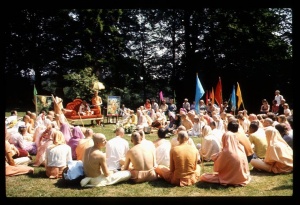CC Madhya 24.197: Difference between revisions
m (1 revision(s)) |
No edit summary |
||
| Line 1: | Line 1: | ||
{{ | [[Category:Sri Caitanya-caritamrta - Madhya-lila Chapter 24|C197]] | ||
<div style="float:left">'''[[Sri Caitanya-caritamrta|Śrī Caitanya-caritāmṛta]] - [[CC Madhya|Madhya-līlā]] - [[CC Madhya 24|Chapter 24: The Sixty-One Explanations of the Atmārāma Verse]]'''</div> | |||
<div style="float:right">[[File:Go-previous.png|link=CC Madhya 24.196|Madhya-līlā 24.196]] '''[[CC Madhya 24.196|Madhya-līlā 24.196]] - [[CC Madhya 24.198|Madhya-līlā 24.198]]''' [[File:Go-next.png|link=CC Madhya 24.198|Madhya-līlā 24.198]]</div> | |||
{{CompareVersions|CC|Madhya 24.197|CC 1975|CC 1996}} | |||
{{RandomImage}} | |||
==== TEXT 197 ==== | ==== TEXT 197 ==== | ||
<div | <div class="verse"> | ||
akāmaḥ sarva-kāmo vā | :akāmaḥ sarva-kāmo vā | ||
mokṣa-kāma udāra-dhīḥ | :mokṣa-kāma udāra-dhīḥ | ||
tīvreṇa bhakti-yogena | :tīvreṇa bhakti-yogena | ||
yajeta puruṣaṁ param | :yajeta puruṣaṁ param | ||
</div> | </div> | ||
| Line 14: | Line 18: | ||
==== SYNONYMS ==== | ==== SYNONYMS ==== | ||
<div | <div class="synonyms"> | ||
''akāmaḥ''—without material desires; ''sarva-kāmaḥ''—full of all material desires; ''vā''—or; ''mokṣa-kāmaḥ''—desiring liberation; ''udāra-dhīḥ''—sincere and advanced in devotional service; ''tīvreṇa''—firm; ''bhakti-yogena''—by the practice of ''bhakti-yoga''; ''yajeta''—should worship; ''puruṣam param''—the Supreme Personality of Godhead. | |||
</div> | </div> | ||
| Line 21: | Line 25: | ||
==== TRANSLATION ==== | ==== TRANSLATION ==== | ||
<div | <div class="translation"> | ||
"'Whether one desires everything or nothing, or whether he desires to merge into the existence of the Lord, he is intelligent only if he worships Lord Kṛṣṇa, the Supreme Personality of Godhead, by rendering transcendental loving service.' | |||
</div> | </div> | ||
| Line 28: | Line 32: | ||
==== PURPORT ==== | ==== PURPORT ==== | ||
<div | <div class="purport"> | ||
This is a quotation from Śrīmad-Bhāgavatam ([[SB 2.3.10]]). | This is a quotation from [[Srimad-Bhagavatam|''Śrīmad-Bhāgavatam'']] ([[SB 2.3.10]]). | ||
</div> | </div> | ||
__NOTOC__ | |||
<div style="float:right; clear:both;">[[File:Go-previous.png|link=CC Madhya 24.196|Madhya-līlā 24.196]] '''[[CC Madhya 24.196|Madhya-līlā 24.196]] - [[CC Madhya 24.198|Madhya-līlā 24.198]]''' [[File:Go-next.png|link=CC Madhya 24.198|Madhya-līlā 24.198]]</div> | |||
__NOTOC__ | |||
__NOEDITSECTION__ | |||
Revision as of 02:13, 15 September 2021
Śrī Caitanya-caritāmṛta - Madhya-līlā - Chapter 24: The Sixty-One Explanations of the Atmārāma Verse

His Divine Grace
A.C. Bhaktivedanta Swami Prabhupada
A.C. Bhaktivedanta Swami Prabhupada
TEXT 197
- akāmaḥ sarva-kāmo vā
- mokṣa-kāma udāra-dhīḥ
- tīvreṇa bhakti-yogena
- yajeta puruṣaṁ param
SYNONYMS
akāmaḥ—without material desires; sarva-kāmaḥ—full of all material desires; vā—or; mokṣa-kāmaḥ—desiring liberation; udāra-dhīḥ—sincere and advanced in devotional service; tīvreṇa—firm; bhakti-yogena—by the practice of bhakti-yoga; yajeta—should worship; puruṣam param—the Supreme Personality of Godhead.
TRANSLATION
"'Whether one desires everything or nothing, or whether he desires to merge into the existence of the Lord, he is intelligent only if he worships Lord Kṛṣṇa, the Supreme Personality of Godhead, by rendering transcendental loving service.'
PURPORT
This is a quotation from Śrīmad-Bhāgavatam (SB 2.3.10).